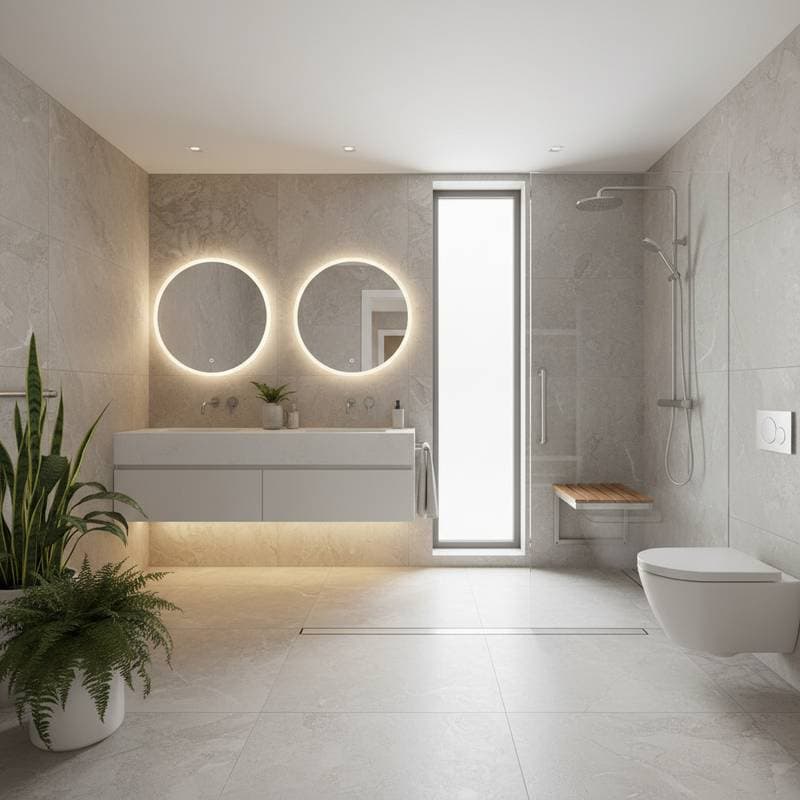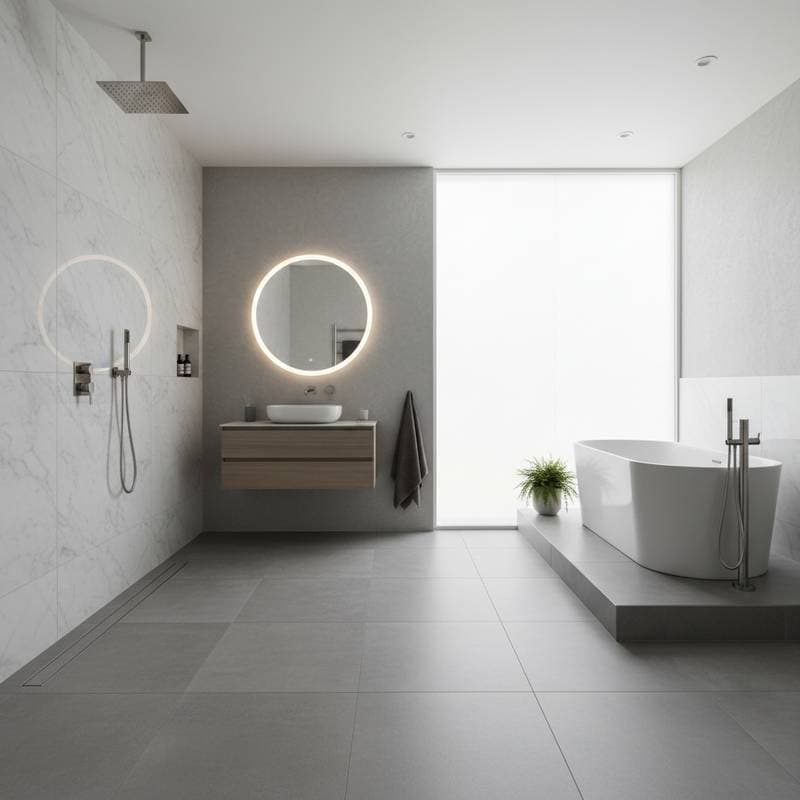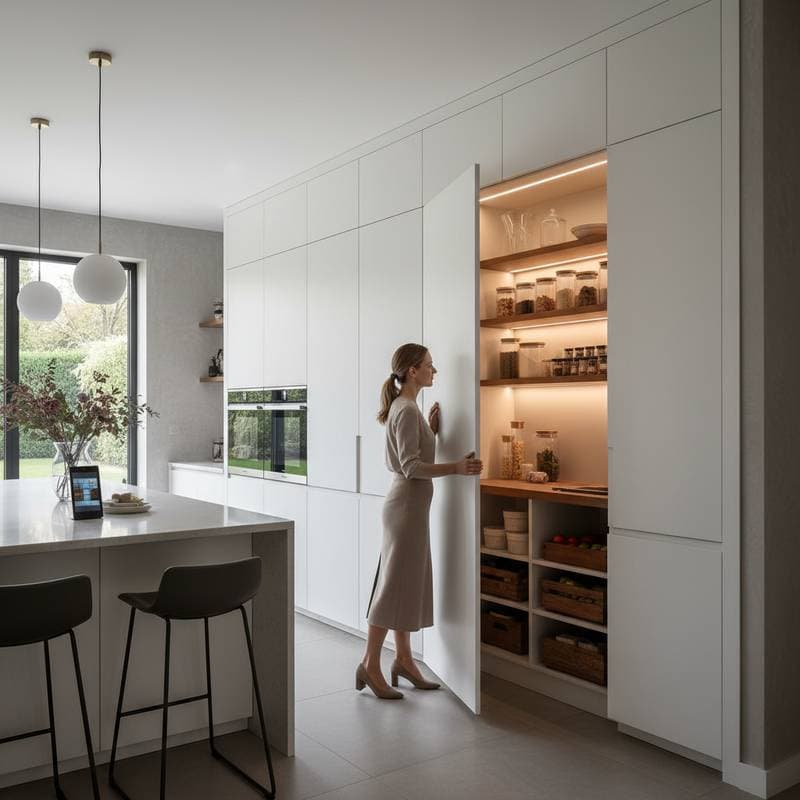2025 Bathroom Remodels: Achieving a 15% Return on Investment
Bathroom renovations in 2025 yield approximately 15 percent return on investment in numerous markets. Homeowners focus on accessibility, energy efficiency, and contemporary design elements. Optimal results emerge from renovations that integrate universal design principles with enduring styles.
Understanding the 15% ROI
The 15 percent return on investment derives from national remodeling analyses and real estate data. This metric reflects the portion of renovation expenses recouped through increased property value. For instance, a $20,000 bathroom project might elevate the home sale price by $23,000. Regional differences influence exact figures, yet the trend persists: thoughtful, functional updates surpass superficial changes.
Returns increase significantly when renovations enhance daily usability. Features like curbless showers, expanded doorways, and non-slip surfaces appeal to forward-thinking younger buyers and those seeking easier living in later years. Accessibility designs have evolved from utilitarian appearances to elegant integrations.
Breakdown of Typical Costs and Influencing Factors
| Task | Typical Cost | Key Price Influences |
|---|---|---|
| Cosmetic Refresh (paint, fixtures) | $3,000 to $7,000 | Room dimensions, fixture brands, finish durability |
| Mid-Range Remodel | $12,000 to $25,000 | Plumbing relocations, tile coverage area, local labor costs |
| Accessibility Package | $8,000 to $18,000 | Installation of grab bars, curbless showers, doorway expansions |
| Full Gut Renovation | $25,000 to $45,000 | Bespoke cabinetry, natural stone counters, structural modifications |
Expenses fluctuate based on geographic location and workforce availability. Urban coastal regions command premium rates, while rural or smaller markets offer 15 to 25 percent savings. Supply chain dynamics for materials and required permitting fees further adjust overall budgets.
Deciding Between DIY and Professional Services
Consider DIY approaches for:
- Hardware replacements, mirror installations, or painting tasks.
- Minor fixture exchanges if plumbing and electrical skills exist.
- Labor savings on surface-level finishes.
Engage professionals for:
- Any plumbing or drainage relocations.
- Tile laying, waterproofing applications, or reinforcement work.
- Projects necessitating permits or inspections.
Professionals manage building code adherence, precise slope adjustments, and warranty protections. A certified contractor verifies that all waterproofing complies with municipal standards. For property sales, documented professional involvement builds buyer trust.
Key Design Elements Boosting ROI
-
Curbless Showers
These feature seamless entries and frameless enclosures, expanding perceived space in compact areas. They minimize fall risks and streamline maintenance routines. -
Wall-Mounted Vanities
Suspended designs free up floor area for better accessibility, including wheelchair navigation. Cleaning becomes simpler with unobstructed surfaces. -
Matte Black or Brushed Brass Hardware
Such finishes resist smudges and convey luxury without ostentation, maintaining broad appeal over time. -
Large-Format Porcelain Tiles
Reduced grout seams decrease upkeep needs. Porcelain offers robust wear resistance and enhanced traction. -
Automated Lighting and Ventilation Systems
Sensor-activated lights and humidity monitors reduce energy consumption while inhibiting mold development. -
Radiant Floor Heating
This system warms tile surfaces for comfort and accelerates moisture evaporation, extending material lifespan. -
Inclusive Design Details
Elements like lever-style faucets, detachable showerheads, and height-adjustable mirrors accommodate varied user needs.
Regional Considerations and Permitting Essentials
In colder regions, incorporate radiant heating and pipe insulation to combat freezing. Humid climates demand robust exhaust systems and moisture-resistant wall materials. Seismic or flood-prone areas require reinforced fixtures and impermeable barriers.
Municipalities typically mandate permits for plumbing or electrical alterations. Surface updates rarely trigger such requirements. Verify specifics with the local building authority to avoid complications. Neglecting permits may hinder sales processes or insurance validations.
Structural changes like wall shifts or drain repositions involve submitting plans and arranging inspections. Qualified contractors often manage these administrative duties efficiently.
Bathroom Remodels Versus Other Home Improvements
| Project | Average ROI | Key Considerations |
|---|---|---|
| Bathroom Remodel | 15% | Prominent daily utility, broad buyer interest |
| Kitchen Remodel | 10% | Major value driver, elevated expenses |
| Exterior Siding Refresh | 8% | Enhances initial impressions |
| Window Replacements | 7% | Delivers efficiency and thermal gains |
| Roof Replacement | 6% | Safeguards integrity, limited aesthetics |
Bathrooms excel due to their blend of practical and aspirational benefits. Prospective buyers envision personal use upon first glance.
Optimal Timing for Bathroom Projects
Schedule renovations in drier periods for humid locales to expedite adhesive and grout setting. Colder areas should steer clear of subzero weather if external plumbing access proves necessary. For selling purposes, complete projects several months prior to market entry, allowing time for final detailing.
Residents enduring on-site work benefit from interim bathing solutions, such as mobile units or alternative space conversions, to sustain normalcy.
Sustainable Upgrades Enhancing Appeal and ROI
Eco-conscious choices now directly influence market desirability. Forward-looking buyers prioritize water conservation and durable, low-care surfaces.
High-impact sustainable options include:
- Dual-flush toilets conserving substantial annual water volumes.
- Daylight-responsive LED fixtures minimizing power draw.
- Pressure-maintaining low-flow showerheads.
- Tiles from recycled glass or porcelain.
- Faucets certified under WaterSense standards.
These selections frequently access utility rebates and trim ongoing operational costs, reinforcing financial returns.
Pitfalls to Avoid in Maximizing Returns
Steer clear of:
- Highly individualized color schemes that limit buyer preferences.
- Inadequate airflow risking mold proliferation.
- Inferior grout selections or omitted sealants.
- Insufficient mirror-area illumination.
- Bypassing expert waterproofing evaluations.
Preventive measures prove far more economical than subsequent corrections.
Quick Answers to Common Questions
What budget yields the best ROI?
Mid-range investments of $12,000 to $25,000 balance cost and impact effectively.
How long does a remodel take?
Expect four to eight weeks, depending on scope and unforeseen issues.
Do smart features justify the expense?
Yes, they enhance efficiency and appeal, often recouping costs through energy savings.
Can I remodel without displacing the family?
Phased approaches minimize disruption, though temporary alternatives aid comfort.
Steps to Launch Your Remodel
Assess current space needs and consult local market data for ROI projections. Select a licensed contractor experienced in accessible designs. Prioritize permits early and integrate sustainable elements from the outset. Finalize with professional staging to highlight enhancements for potential buyers.












